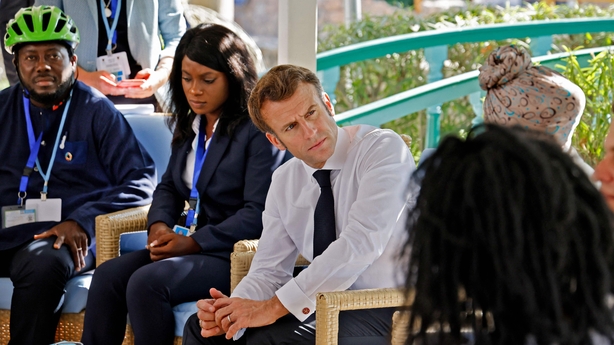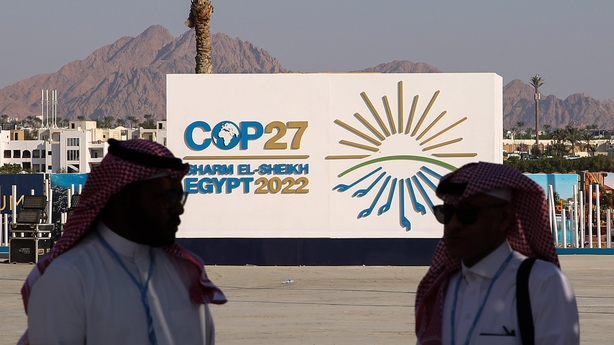United Nations Secretary General Antonio Guterres told countries gathered at the start of the COP27 summit in Egypt today they face a stark choice: work together now to cut emissions or condemn future generations to climate catastrophe.
The speech set an urgent tone as governments sit down for two weeks of talks on how to avert the worst of climate change, even as they are distracted by Russia’s war in Ukraine, rampant consumer inflation and energy shortages.
“Humanity has a choice: cooperate or perish,” Mr Guterres told delegates gathered in the seaside resort town of Sharm el-Sheikh.
He called for a pact between the world’s richest and poorest countries to accelerate the transition from fossil fuels and funding to ensure poorer countries can reduce emissions and cope with the climate impacts that have already occurred.
“The two largest economies – the United States and China – have a particular responsibility to join efforts to make this pact a reality,” he said.
Despite decades of climate talks – the Egypt COP is the 27th Conference of the Parties – progress has been insufficient to save the planet from excessive warming as countries are too slow or reluctant to act, he noted.
“Greenhouse gas emissions keep growing. Global temperatures keep rising. And our planet is fast approaching tipping points that will make climate chaos irreversible,” he said. “We are on a highway to climate hell with our foot on the accelerator.”
Nearly 100 heads of state and government will speak at the Cop27 summit today and tomorrow, but China’s President Xi Jinping is not attending the conference and US President Joe Biden will come later this week following tomorrow’s US midterm elections.
The summit comes as nations worldwide are facing increasingly intense natural disasters that have taken thousands of lives this year alone and cost billions of dollars.
Mr Guterres said many of today’s conflicts were linked with growing climate chaos, pointing to the war in Ukraine as exposing the “profound risks of our fossil fuel addiction”.
“Today’s crises cannot be an excuse for backsliding or greenwashing. If anything, they are a reason for greater urgency, stronger action and effective accountability,” he said.
He called on G20 countries to accelerate the transition to net zero emissions in this decade, telling developed countries they must take the lead, but emerging economies were also critical to bending the emissions curve.
“The deadly impacts of climate change are here and now. Loss and damage can no longer be swept under the rug. It is a moral imperative.
“Those who contributed least to the climate crisis are reaping the whirlwind sown by others. Many are blindsided by impacts for which they had no warning or means of preparation.”
He called for a universal early warning system coverage within five years, governments to tax the windfall profits of fossil fuel companies and concrete results at Cop27 on addressing loss and damage suffered by poorer countries.

Meanwhile, French President Emmanuel Macron has urged the United States, China and other non-European rich nations ahead of COP27 talks to pay their fair share to help poorer countries deal with climate change.
“We need the United States and China to step up” on emissions cuts and financial aid, Mr Macron told French and African climate campaigners on the sidelines of the UN climate summit in Sharm el-Sheikh, Egypt.
“Europeans are paying,” he said. “We are the only ones paying.”
“Pressure must be put on rich non-European countries, telling them, ‘you have to pay your fair share’,” he said.
Stepping up financial aid to poorer countries that face the brunt of climate-induced disasters has emerged as a major issue at the 13-day climate conference that began yesterday.
The heads of developing nations won a small victory when delegates agreed to put the controversial issue of money for “loss and damage” on the agenda.

At the opening ceremony, COP27 officials urged governments to keep up efforts to combat climate change despite the economic crises linked to Russia’s war on Ukraine, an energy crunch, soaring inflation and the persistent Covid-19 pandemic.
“The fear is other priorities take precedence,” top United Nations climate change official Simon Stiell told a news conference.
The “fear is that we lose another day, another week, another month, another year – because we can’t”, he said.
The world must slash greenhouse emissions 45% by 2030 to cap global warming at 1.5C above late-19th-century levels.
But current trends would see carbon pollution increase 10% by the end of the decade and Earth’s surface heat up 2.8C, according to findings unveiled in recent days.
Only 29 of 194 countries have presented improved climate plans, as called for at the UN talks in Glasgow last year, Mr Stiell noted.
Read More:
Acceleration of delivery on climate pledges needed – Taoiseach
What is COP27 and what are the environmental aims?
Fresh from his own election victory, Brazil’s Luiz Inacio Lula da Silva is expected to attend the summit, with hopes high that he will protect the Amazon from deforestation after defeating climate-sceptic President Jair Bolsonaro.
Another new leader, British Prime Minister Rishi Sunak, reversed a decision not to attend the talks and is due to urge countries to move “further and faster” in transitioning away from fossil fuels.
Pakistan, which chairs the powerful G77+China negotiating bloc of more than 130 developing nations, has made the “loss and damage” issue a priority.
“We definitely regard this as a success for the parties,” said Egypt’s Sameh Shoukry, who chairs the COP27.
The United States and the European Union have dragged their feet on the issue for years, fearing it would create an open-ended reparations framework.
But European Commission Vice President Frans Timmermans welcomed the inclusion of loss and damage, saying on social media that the “climate crisis has impacts beyond what vulnerable countries can shoulder alone”.
Rich nations will also be expected to set a timetable for the delivery of $100 billion per year to help developing countries green their economies and build resilience against future climate change.
The promise is already two years past due and remains $17 billion short, according to the OECD.
COP27 is scheduled to continue until 18 November with ministerial meetings.
‘Significant progress’
Malcolm Noonan, Green Party TD and Minister of State for Heritage & Electoral Reform has said that COP27 needs to see “significant progress” and that Ireland will hold itself and other leaders to account.
Speaking about COP26, he said that there was a lot of despair afterwards such as from NGOs.
He said that agreements had started to see the curve go downwards but it was not enough and significant progress is needed at COP27.
Mr Noonan said a particularly challenging element was going to be countries most affected by climate change that have done least to cause it, but the COPs are “important for direct engagement for policy makers, delegates and world leaders”.
“The warnings are dire and the UN shows that we’re way off.”
He said that that was the challenge and there had to be real ambition, but the fact this was an African COP should focus minds of developed nations.
He said that after the Taoiseach presents Ireland’s commitments tomorrow, Ireland would be a leader in holding other countries to account.
He added that Ireland was heading in the right direction in terms of offshore renewables and it would scale up at pace and that the farming sector is willing to play its part and there is good engagement.
“It is going to require collective and collaborative action over the next number of months and years but we do have to achieve these targets.”
We’re on a highway to climate hell, UN boss tells COP27
Source: Viral Trends Report


0 Comments